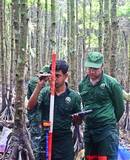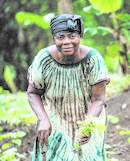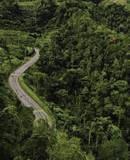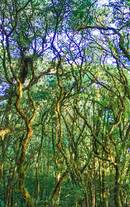News

Reducing emissions from deforestation and forest degradation (REDD+) may lead to a significant increase in the amount of carbon sequestered by forests, contributing greatly to national and international efforts to combat climate change. To better plan and report on REDD+ actions, participating countries are required to monitor and report on their carbon inventories. Therefore, the selection of methods for estimating biomass stocks and carbon storage is critical to the effectiveness of REDD+.
Use of allometric equations
Tree biomass, volume and carbon stocks can be estimated using various methods, however, the use of allometric models is considered the most common one. Although some...

Often in the past, policies and programs to protect and expand forests have had an environmental or production focus, while the interest, needs and knowledge of people depending on them have not always been taken into account. Since then, the world has learned many lessons and has come a long way in understanding the importance of local communities’ knowledge and engagement in planning and implementing efforts to reduce forest loss.
REDD+ holds a unique position in this matter, as it has the potential to attract international and national attention while increasing support for strengthening communities’ rights and stewardship of forests and...
REDD+ nesting: reducing emissions, forest monitoring and benefit sharing at multiple scales
05/12/2018
05/12/2018

Many countries around the world are working to reduce emission from deforestation and forest degradation, sustainably manage, conserve and enhance forest carbon stocks (REDD+). Regional South-South exchanges have emerged to share knowledge and advance together the battle against climate change. Two recent Regional South-South Exchanges of the UN-REDD Programme addressed important issues for REDD+ countries in Asia-Pacific and Africa. The issue of ‘nesting’ has consistently attracted much attention from country decision makers at those events: the question being how actions at smaller scales can best be catalysed to contribute to larger-scale jurisdictional performance, whether at national or subnational scales.
Subnational or...

To reduce fire risk and stop enormous amount of carbon from being emitted from the soil into the atmosphere, Indonesia is rewetting over two million hectares of dried out peatlands, while scaling up information sharing on these the carbon-rich wetlands globally.
Globally, the vital importance of peatlands has historically been poorly understood, and they are frequently drained for plantations, farming and forestry. In an effort to reduce the fire risk, the government has stepped up law enforcement to make sure peatland regulations – including a nationwide ban prohibiting new peatland drainage – are enforced.
While knowledge of tropical peatlands has hugely increased...
The UN-REDD Programme celebrates 10 years, and looks to future at 2nd Executive Board Meeting
27/10/2018
27/10/2018

The UN-REDD Programme is celebrating 10 years of successfully working with 64 countries to achieve climate and forest goals. The Programme will continue to play a key role at the global level to strengthen countries capacity to better protect, manage and monitor their forests, to advance forest-related investments in partner countries and to support strategies and market access for deforestation-free agriculture commodities as a measure to halt deforestation and ultimately deliver emission reductions.
The 10-year anniversary represents a positive momentum to not only evaluate the Programme’s past successes but to plan future work. To do so, the UN-REDD Programme Executive Board...

